FINANCE
Musk now gets chance to defeat Twitter’s many fake accounts
Published
2 years agoon

Twitter’s unending fight against spam accounts is now a problem for new owner Elon Musk, who pledged in April to defeat the bot scourge or “die trying!”
He later cited bots as a reason to back out of buying the social platform. Now that the billionaire has completed the deal, he’s faced with the task of delivering on his promise to clean up the fake profiles that have preoccupied him and bedeviled Twitter since long before he expressed interest in acquiring it.
The challenge carries high stakes. The bot count matters because advertisers — Twitter’s chief revenue source — want to know roughly how many real humans they are reaching when they buy ads. It’s also important in the effort to stop bad actors from amassing an army of accounts to amplify misinformation or harass political adversaries.
“The bigger picture in my mind is: How do we make Twitter a better place for everybody,” said bot-counting expert Emilio Ferrara, who worked over the summer to investigate the problem for Musk. He cited the “value of the platform as a societal experience, as a collective place to have civilized discourse and talk freely without interference from nefarious accounts,” or scams, spam, pornography and harassment.
To find out just how bad the bots are, Musk hired Ferrara and other data scientists to investigate. At the time, he sought to prove that Twitter was misleading the public when it said fewer than 5% of its daily active users are fake or spam accounts. If Twitter lied or withheld crucial information about the bot count, Musk could argue that he was justified in terminating the $44 billion agreement.
Ferrara, an associate professor of computer science and communications at the University of Southern California, said he had no real interest in whether Musk ultimately ended up owning the platform.
Instead, he hoped that “any findings would be able to help improve the platform,” Ferrara told The Associated Press, speaking for the first time about his planned role as Musk’s expert trial witness.
The question now is what Musk will do with that information. Ferrara’s presentation — some 350 pages of analysis and supporting documents — is locked up in confidential court filings, and he said he can’t disclose his conclusions.
Twitter’s former leaders and its lawyers said Musk wildly exaggerated the problem because he had buyer’s remorse. Precise counts are “almost impossible” because any bot estimate is based on assumptions that can lead to bias, said Filippo Menczer, a researcher who was not working for either side in the dispute.
“Nobody knows exactly how bad the problem is,” said Menczer, director of Indiana University’s Observatory on Social Media. “I would guess it’s not as bad as Musk said and not as good as Twitter claimed.”
Many experts also doubt Musk’s ability to easily make improvements, which he’s suggested would rely on using algorithms to track and remove fake accounts and implementing new measures to “authenticate” real people.
Earlier this month, Ferrara was preparing to travel to the East Coast to testify in Delaware, where Musk was defending against Twitter’s lawsuit asking a court to force him to close the deal. But two weeks before the scheduled Oct. 17 trial, Musk changed his mind and said he would go ahead with the $44 billion acquisition. It closed Thursday.
Most legal experts didn’t think Musk had much of a case. The court’s head judge seemed likely to side with Twitter based on the specific terms and conditions of the April purchase agreement.
But that’s not to say Musk didn’t have a point about the bots, according to Ferrara and other researchers hired by Musk’s legal team.
The analysis firm CounterAction, which worked with Ferrara, said it concluded in a July 18 report submitted to the court that Twitter’s spam rate for monetizable accounts — those of value to advertisers — was at least 10% and could be as high as 14.2%, depending on how the rate is measured.
Trevor Davis, the firm’s founder and CEO, said that analysis was based on a “firehose” of internal data that Twitter gave to Musk, but the company declined to provide additional data sought by Musk’s team.
“We expect that access to the withheld data would reveal an even higher true spam rate,” Davis said in a prepared statement.
Musk has long been preoccupied with Twitter spambots promoting cryptocurrency schemes, in part because as a celebrity user with more than 110 million followers, he sees a lot of them. Some scammers have opened accounts mimicking Musk’s name and likeness to try to get people to think he’s endorsing something.
Not all bots are bad. Twitter encourages the use of automated accounts that report the weather, earthquakes or post humor or lines from literary classics. Twitter also allows for anonymity, which protects free speech and privacy — especially in authoritarian regions. But that practice can make it harder to root out malicious fake accounts.
Ferrara first caught Twitter’s attention in the aftermath of revelations that Russia used social media to meddle in the U.S. presidential election in 2016, when he led a research group that estimated that 9% to 15% of Twitter’s active English-language accounts were bots.
In a blog post soon after, Twitter complained that such outside research “is often inaccurate and methodologically flawed.” The company has repeatedly reported the under-5% number in its quarterly filings to the Securities and Exchange Commission, though it also cautions that it could be higher.
Before Musk’s takeover, Twitter said it removed 1 million spam accounts each day. To calculate how many accounts are malicious spam, Twitter reviews thousands of accounts sampled at random, using both public and private data such as IP addresses, phone numbers, geolocation and how the account behaves when it is active.
But over the past months, Musk and Twitter have tussled over the methodology. Twitter uses a metric it calls mDAU, for monetizable daily active usage.
That “is literally a metric they invented,” Ferrara said. “You cannot contrast and compare that metric with any other service.”
When Musk first started publicly raising questions about the bot numbers after agreeing to buy the company, another firm, Israel-based Cyabra, said it had the answer.
“That elusive number you are looking for … we have it. It’s 13.7%,” the firm tweeted on May 17, flagging Musk’s Twitter handle to get his attention.
Cyabra’s machine-learning technology works by scanning a large number of social media profiles to track behavioral patterns, trying to pick out which are behaving like humans. Such guesswork can misfire — but the tweet caught the attention of people close to Musk, if not the billionaire himself.
Cyabra CEO Dan Brahmy said the company started working with the Musk camp by the end of May. Regardless of what the true count is, he said it’s not going to be an easy problem to solve.
“Some bots are definitely nefarious,” Brahmy said. “The trade-offs are between being extremely high on sign-up standards and information security versus being extremely open minded in a way” that fosters freedom of speech and creativity.
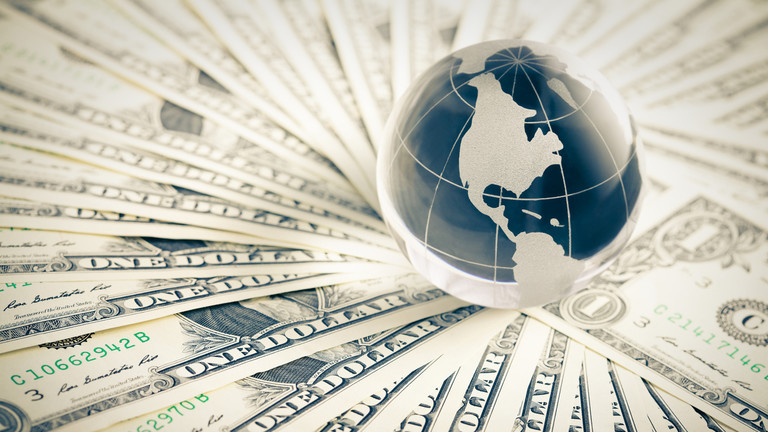
It’s now $45 trillion higher than its pre-pandemic level and is expected to continue growing rapidly, a top trade body has warned
The global debt pile increased by $8.3 trillion in the first quarter of the year to a near-record high of $305 trillion amid an aggressive tightening of monetary policy by central banks, the Institute of International Finance (IIF) has revealed.
According to its Global Debt Monitor report on Wednesday, the reading is the highest since the first quarter of last year and the second-highest quarterly reading ever.
The IIF warned that the combination of such high debt levels and rising interest rates had pushed up the cost of servicing that debt, prompting concerns about leverage in the financial system.
“With financial conditions at their most restrictive levels since the 2008-09 financial crisis, a credit crunch would prompt higher default rates and result in more ‘zombie firms’ – already approaching an estimated 14% of US-listed firms,” the IIF said.
Despite concerns over a potential credit crunch following recent turmoil in the banking sectors of the United States and Switzerland, government borrowing needs to remain elevated, the finance industry body stressed.
According to the report, aging populations and rising healthcare costs continue putting strain on government balance sheets, while “heightened geopolitical tensions are also expected to drive further increases in national defense spending over the medium term,” which would potentially affect the credit profile of both governments and corporate borrowers.
“If this trend continues, it will have significant implications for international debt markets, particularly if interest rates remain higher for longer,” the IIF cautioned.
The report showed that total debt in emerging markets hit a new record high of more than $100 trillion, around 250% of GDP, up from $75 trillion in 2019. China, Mexico, Brazil, India and Türkiye were the biggest upward contributors, according to the IIF.
As for the developed markets, Japan, the US, France and the UK posted the sharpest increases over the quarter, it said.
For more stories on economy & finance visit TSFT’s business section
You can share this story on social media:
PLEASANT MUSIC FOR YOUR CAFE, BAR, RESTAURANT, SWEET SHOP, HOME
SUITABLE MUSIC FOR YOGA LOVERS
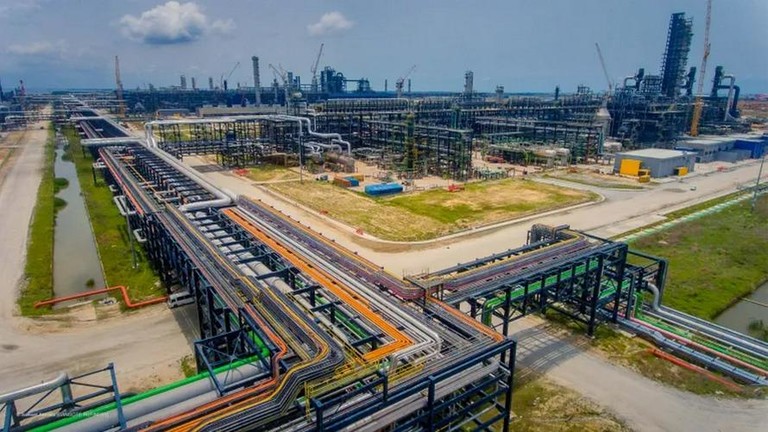
The West African country has built a giant oil refinery to cover domestic demand
Nigeria will commission its new Dangote Petroleum Refinery on Monday in hope of alleviating the chronic fuel shortages that have turned Africa’s biggest oil producer into a fuel importer.
The processing plant, which has capacity of 650,000 barrels per day, is expected to cover all of the country’s fuel demand, according to Nigerian media.
Built by Dangote Group, a conglomerate owned by billionaire industrialist and Africa’s richest man Aliko Dangote, at the Lekki free trade zone near the city of Lagos, the refinery is being touted as a way to end the country’s reliance on imports for nearly all of its refined petroleum products.
The giant complex is one of Nigeria’s single largest investments. It comprises a 435-megawatt power station, a deep seaport and a fertilizer unit. Initially, $12 billion was earmarked to build the refinery, but the project ended up costing $19 billion after years of delay.
Crude processing is scheduled to begin in June, although the research consultancy firm Energy Aspects said that commissioning was an intricate process and that the facility may only start operating later this year. It is expected to reach about 50-70% of processing capacity next year and full capacity by 2025.
The refinery will produce Euro-V quality gasoline and diesel, as well as jet fuel and polypropylene, the company said, adding that the facility was “designed to process a large variety of crudes including many of the African crudes, some of the Middle Eastern crudes and the US Light Tight Oil.”
Despite being Africa’s biggest oil producer, Nigeria imports petrol, diesel, and processed petroleum products because many of its own refineries have dilapidated over the years.
Russia accounts for lion’s share of India’s oil imports – Reuters
Dangote expects the new plant to cover Nigeria’s domestic fuel needs and produce extra volumes for export. It is also expected to boost the market for Nigerian crude to $21 billion per year, the company added.
The Nigerian National Petroleum Corporation has a contract with Dangote to supply some 300,000 barrels of crude per day. However, theft, pipeline vandalism, and underinvestment poses a threat to achieving full output, economist Kelvin Emmanuel told Reuters.
In April, Nigerian oil production slumped under 1 million bpd, below Angola’s output, data showed.
According to Emmanuel, Dangote might be importing oil from international trading companies such as Trifigura and Vitol, as the refinery has not yet signed agreements with oil majors in Nigeria.
Meanwhile, Energy Aspects expects the Dangote refinery to not only solve Nigeria’s fuel shortages but also to reshape the gasoline market in the Atlantic basin.
For more stories on economy & finance visit TSFT’s business section
You can share this story on social media:
PLEASANT MUSIC FOR YOUR CAFE, BAR, RESTAURANT, SWEET SHOP, HOME
SUITABLE MUSIC FOR YOGA LOVERS
FINANCE
US will default if debt deal fails – treasury secretary
Published
12 months agoon
May 24, 2023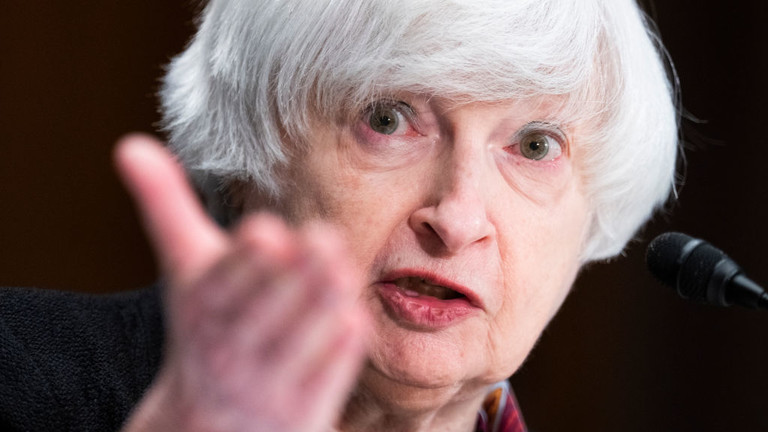
The current borrowing limit is a constraint on Washington’s ability to meet its obligations, Janet Yellen insists
America’s chances of paying its bills after June 1 are “quite low,” US Treasury Secretary Janet Yellen warned on Sunday in an interview with NBC’s ‘Meet the Press’.
According to Yellen, if Congress fails to reach an agreement on raising the country’s $31.4 trillion borrowing limit by that time, it will be forced to default on “some bills” shortly after.
“There’s always uncertainty about tax receipts and spending. And so it’s hard to be absolutely certain about this, but my assessment is that the odds of reaching June 15, while being able to pay all of our bills, is quite low… My assumption is that if the debt ceiling isn’t raised, there will be hard choices to make about what bills go unpaid,” Yellen said.
The treasury secretary did not say which ‘bills’ she had in mind, but noted that the government’s most immediate obligations range from paying interest on outstanding debt to “obligations to seniors who count on social security, military, contractors who’ve provided services to the government.”
She added that “there can be no acceptable outcomes if the debt ceiling isn’t raised.”
The administration of US President Joe Biden and Republicans led by House Speaker Kevin McCarthy have been at an impasse over raising the debt ceiling for several months, despite warnings that the US could face its first-ever default unless it is raised by June 1.
Republicans are refusing to agree to the move unless Biden agrees to government spending cuts and curbs on social programs.
Some lawmakers have called on Biden to invoke his powers under the 14th Amendment to the Constitution and bypass Congress and unilaterally raise the debt ceiling. However, Biden told reporters on Sunday that while he has considered doing so, there is likely not enough time before the deadline.
Biden and McCarthy are scheduled to meet again on Monday to discuss the matter.
For more stories on economy & finance visit TSFT’s business section
You can share this story on social media:
PLEASANT MUSIC FOR YOUR CAFE, BAR, RESTAURANT, SWEET SHOP, HOME
SUITABLE MUSIC FOR YOGA LOVERS



Global debt balloons to record highs

German military to sell tons of toilet paper

First female Saudi astronaut heads to space

Nigeria takes step to combat fuel shortages

US will default if debt deal fails – treasury secretary

Village People demand Trump stop using their music

Hollywood star pulls out of hosting awards show amid strike

Rock icon slams German authorities

Agatha Christie novels chopped by ‘sensitivity readers’ – media

Marvel star back in training after breaking over 30 bones

Turkish minister escapes fire blast (VIDEO)

Trump savages pop star’s Super Bowl performance

Alec Baldwin sued by Ukrainian family of slain cinematographer

Duran Duran stumbles, Dolly Parton rolls into Rock Hall

Sweden probes possible plot behind Russian pipeline leaks

FINANCE


Global debt balloons to record highs
It’s now $45 trillion higher than its pre-pandemic level and is expected to continue growing rapidly, a top trade body...


Nigeria takes step to combat fuel shortages
The West African country has built a giant oil refinery to cover domestic demand Nigeria will commission its new Dangote...
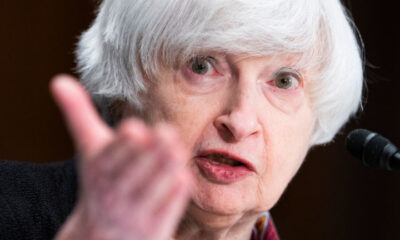

US will default if debt deal fails – treasury secretary
The current borrowing limit is a constraint on Washington’s ability to meet its obligations, Janet Yellen insists America’s chances of...


Facebook parent Meta fined €1.2 billion by Irish watchdog
The American tech company has been accused of violating EU data privacy rules US tech giant Meta has been hit...


UK’s business with sanctioned country booming
Trade between Britain and Iran has reached the highest level in a decade, according to official data, apparently having been...

POLITICS


Erdogan election defeat would be ‘revenge’ – Syrian Kurds
The YPG claims the Turkish president failing to win another term would be payback for Ankara’s counter-terrorism operations in Syria...


Chinese special envoy meets with Zelensky
Li Hui visited Kiev to share Beijing’s views on a political settlement to the Ukraine crisis Ukrainian President Vladimir Zelensky...


Pakistan’s top court orders release of former PM Imran Khan
Pakistan’s Supreme Court has ordered the release of former prime minister Imran Khan, whose arrest earlier this week triggered deadly...


Kamala Harris to run AI taskforce
The US vice president will ask AI execs to evaluate the safety and fairness of their models US Vice President...


Most Americans want to move on from Biden and Trump – poll
70% of respondents said the incumbent shouldn’t bid for office in 2024, with that figure 60% for the Republican former...

OPINION


Disgraced ex-PM Liz Truss seeks to ruin any hopes for normal UK-China ties
The former premier’s Taiwan trip is nothing but a provocation for Beijing to lash out at London, sinking any constructive...


India facing challenge to steer SCO agenda away from Western-dominated frameworks
The Shanghai Cooperation Organisation is looking at ways to address the most pressing global issues without being a disruptive influence...


China isn’t the biggest threat to Italy’s prosperity
Rome is considering leaving the Belt and Road Initiative in a move which will place virtue signaling to other Western...


Meet the Czech lawyer who rallies thousands to shake up the EU establishment
In mid-April, a fledgling political party that recently formed in the Czech Republic called Pravo Respekt Odbornost (Law Respect Expertise;...


UK shows signs of good will to China, but it’s not the one calling the shots in this relationship
The British foreign secretary says antagonizing Beijing goes against London’s ‘national interests’, but Washington has other ideas British Foreign Secretary...

LIFE


conic Smiths bassist dies aged 59
The bassist with legendary English rock band The Smiths, Andy Rourke, has died at the age of 59, the group’s...


Village People demand Trump stop using their music
A viral video emerged last week of Donald Trump dancing to a Village People song at his Florida estate Village...


Hollywood star pulls out of hosting awards show amid strike
Drew Barrymore is stepping down as host of this year’s MTV Movie & Music Awards, due to be held on...


Mexico condemns US ‘interference’ in drug war
The DEA’s infiltration of the Sinaloa Cartel without state permission amounts to espionage, the Mexican president says Mexican President Andres...


Rock icon slams German authorities
Pink Floyd co-founder Roger Waters criticized the city of Frankfurt for canceling his concert and vowed to take legal action...



Trending
-

 FINANCE12 months ago
FINANCE12 months agoFacebook parent Meta fined €1.2 billion by Irish watchdog
-
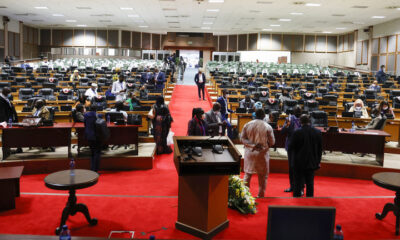
 NEWS12 months ago
NEWS12 months agoKenya supports creation of pan-African court
-

 FINANCE12 months ago
FINANCE12 months agoUS will default if debt deal fails – treasury secretary
-

 FINANCE12 months ago
FINANCE12 months agoGlobal debt balloons to record highs
-
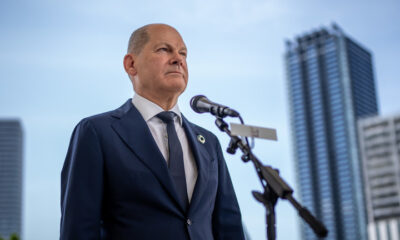
 WAR12 months ago
WAR12 months agoUkraine won’t join NATO anytime soon – Scholz
-

 NEWS12 months ago
NEWS12 months ago‘Subway killer’ Daniel Penny’s actions expose a gap in US law enforcement
-

 NEWS12 months ago
NEWS12 months agoGerman military to sell tons of toilet paper
-

 NEWS12 months ago
NEWS12 months agoFirst female Saudi astronaut heads to space


